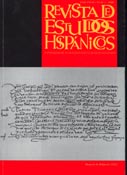Resumen
Reinaldo Arenas was an enemy of Fidel Castro and the revisionist communism associated with him. But this does not necessarily exclude the possibility of a creative engagement with Marxism in his works and a Marxist interpretation of them. In his autobiography Antes que anochezca Arenas denies having any political affiliation:
"Por otra parte, nunca me he considerado ser ni de izquierda ni de derecha, ni quiero que se me catalogue bajo ninguna etiqueta oportunista y política; yo digo mi verdad, lo mismo que un judío que haya sufrido el racismo o un ruso que haya estado en un gulag, o cualquier ser humano que haya tenido ojos para ver las cosas tal como son; grito, luego, existo."
This apolitical stance can be regarded as an autobiographical figuration of self that conceals an engagement with Marxism that is most evident in Arenas's novels. As Sylvia Molloy has observed, "Spanish American autobiographers are most efficient self-censors who, within their life stories, map out silences that point to the untellable-and often tell what they feel cannot be told autobiographically in other, less compromising texts." Arenas had no reason to be amicably disposed to the left, as he was treated like a pariah in Cuba, and like an outcast by pro-Castro leftists in the United States. Even though he had good reason to reject what he describes as the left in Antes que anochezca, the influence of Marxist thought is noticeable in much of his work. This may seem to be paradoxical in a writer who declared himself to be an enemy of communism, but what is unequivocally rejected in Arenas's texts is not Marxism as such, but what he considers to be the failed attempts to create communist societies in Cuba and elsewhere, and the supporters and apologists for these attempts. The end of the 20th century is once again a time of proletarian revolution that will produce renewed attempts to create communist societies. Within this context, the critique of revisionism contained in Otra vez el mar is particularly relevant.
Citas
Althusser, Louis. "Ideology and Ideological State Apparatuses." Lenin and Philosophy. Trans. Ben Brewster. New York: Monthly Review Press, 1971. 127-86.
Arenas, Reinaldo. Antes que anochezca. Barcelona: Tusquets, 1992.
----· El mundo alucinante. Mexico City: Editorial Diogenes, 1969.
----· Otra vez el mar. Barcelona: Editorial Argos Vergera, 1982.
Avakian, Bob. Phony Communism is dead ... Long Live Real Communism. Chicago: RCP Publications, 1992.
Eagleton, Terry. Ideology. London: Verso, 1991.
Gonzalez Echevarria, Roberto. "An Outcast of the Island." New York Times 24 Oct. 1993, sec. 7: 1 +.
Jameson, Fredric. The Political Unconscious: Narrative as a Socially Symbolic Act. Ithaca: Cornell University Press, 1981.
Lacan, Jacques. "The Mirror Stage as Formative of the Functions of the I." Trans. Alan Sheridan. Écrits. New York: Vintage, 1977. 1-7.
Mambisa, Rudi. "Notes on the Political Economy of Cuba." World to Win 14 (1989): 68+; 15 (1990): 74-84.
Marx, Karl. Capital Volume One. Trans. Ben Fowkes. New York: Vintage Books, 1977.
Molloy, Sylvia. At face value. London: Oxford University Press, 1991.
Revolutionary Communist Party, USA. Cuba: The Evaporation of a Myth. Chicago, RCP Publications, 1983.
Rodríguez, Alicia. "La mujer en la obra de Reinaldo Arenas." Reinaldo Arenas: recuerdo y presencia. Ed. Reinaldo Sánchez. Miami: Ediciones Universal, 1994. 151-59.
Soto, Francisco. Reinaldo Arenas: The Pentagonía. Gainesville: The University Press of Florida, 1994.
Valero, Roberto. "Otra vez Arenas y el mar." Reinaldo Arenas: alucinaciones fantasías y realidad. Ed. Julio Hernández-Miyares and Perla Rozencvaig. Glenview: Scott, Foresman/Montesinos, 1990. 104-13.

Esta obra está bajo una licencia internacional Creative Commons Atribución-NoComercial 4.0.

